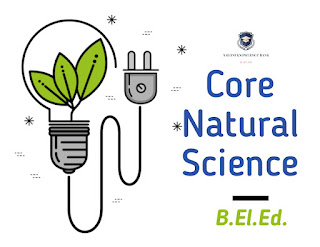Student Contact Hours: 90
Maximum Mark: 50
- Internal Assessment: 15
- Annual Examination: 35
C 1.3 CORE NATURAL SCIENCE
Part I
It is envisaged that most of the content will be transacted using the discovery approach, through simple observations and experiments, followed by discussion. Wherever necessary, additional information may be supplied by the teacher at the end of each activity.
Unit 1
Classification, property, concept, relation, law.
Unit 2
Measurement of length, mass and time; density; pressure; work and energy; weight; falling of bodies; gravitation; heat and temperature; states of matter; properties of magnets; electricity ; refraction and dispersion.
Unit 3
Physical and chemical changes; separation of mixtures; atoms and molecules; meta. and non-metals; oxides; acids; bases and salts; air and combustion; water-hard and soft.
Unit 4
Living and non-living; classification of living world; germination of seeds; life processes e.g. respiration, digestion, reproduction, photosynthesis, transportation, phenomena, interdependence of plants and animals.
Part II
It is expected that investigative projects will involve some or all of the following elements - laboratory work, library reference, field-survey, group discussion, seeking expert opinion.
3 Projects : not more than one project from each area :
P1 - Natural Phenomena
P2 - Environment and Adaptation
P3 - Technology
P4 - Health
For suggested list of possible questions to be investigated see Annexure I
Annexure 1
P1
1. Why is the sky blue ?
2. Why does it rain ?
3. Why do stars twinkle ?
4. How many colours are there in a rainbow ?
P2
1. Why don't lizards fall from ceilings ?
2. Why does a dog go round in a circle before it sits down?
3. How do fish survive without air?
4. Can human beings live on grass?
5. Why does a cat produce kittens and not baby camels?
P3
1. How is glass made ?
2. How is electricity generated?
3. From where does a TV set get its pictures?
4. What is inside a camera ?
P4
1. Why do teeth decay?
2. Why does hair fall ?
3. Does bad blood cause pimples ?
4. Why do ears run ?
Reading material will be uploaded soon.
Stay Tuned.
#Saloniknowledgebank #B.El.Ed.knowledgebank #Saloni'sknowledgebank #B.El.Ed. #Bachelorofelementaryeducation






0 Comments